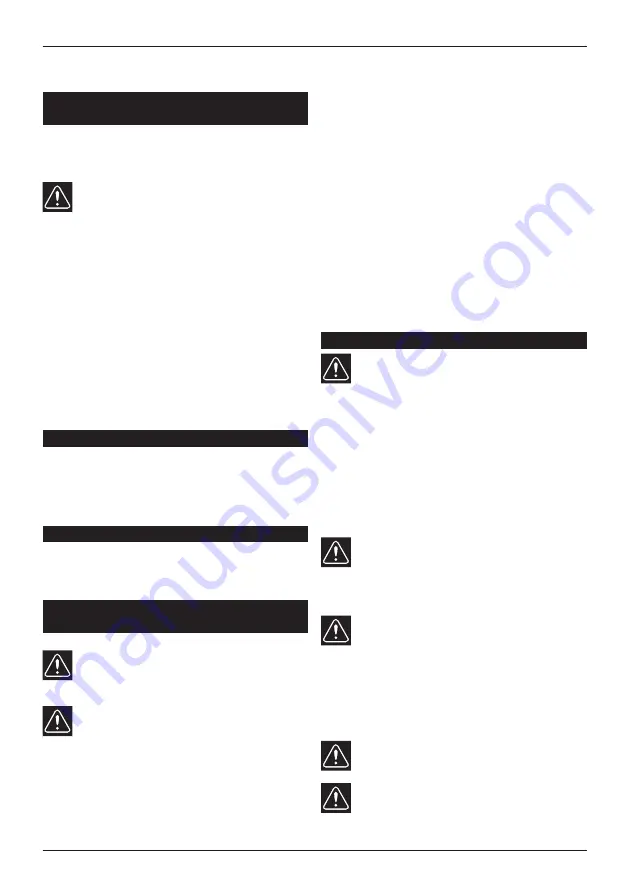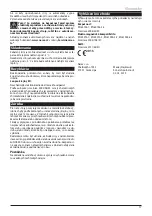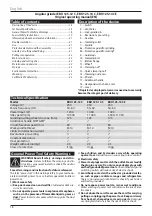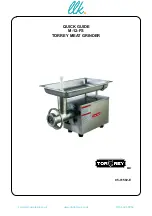
English
21
ing, do not allow any interference of the wire wheel or
brush with the guard.
Wire wheel or brush may expand
in diameter due to work load and centrifugal forces.
Information about noise level and
vibrations
The values have been measured in conformity with EN 60745.
Acoustic pressure level L
pA
= 90.2 dB (A).
Acoustic power level L
wA
= 101.2 dB (A).
In accuracy of measurements K = 2 dB (A).
ATTENTION! Noise is generated during work!
Use ear protection!
The weighted value of vibrations affecting hands and arms
a
h
= 2.64 m.s
-2
.
In accuracy of measurements K = 1 m.s
-2
.
The emission values specified (vibration, noise) were meas-
ured in accordance with the test conditions stipulated in
EN 60745 and are intended for machine comparisons. They are
also used for making preliminary estimates regarding vibra-
tion and noise loads during operation.
The emission values specified refer to the main applications
for which the power tool is used. If the electric power tool is
used for other applications, with other tools or is not main-
tained sufficiently prior to operation, however, the vibration
and noise load may be higher when the tool is used.
Take into account any machine idling times and downtimes
to estimate these values more accurately for a specified time
period. This may significantly reduce the load during the ma-
chine operating period.
Double insulation
To ensure maximum safety of the user, our tools are designed
and built to satisfy applicable European standards (EN stand-
ards). Tools with double insulation are marked by the inter-
national symbol of a double square. These tools must not be
grounded and a two-wire cable is sufficient to supply them
with power. Tools are shielded in accordance with EN 55014.
Use
The machine is designed for splitting, roughing and brushing
metal and stone materials without the use of water. For cut-
ting stone, a cutting guide is required.
The user himself is liable for any improper use.
Protective elements and their
assembly
The grinder may be used with mounted protective guard only!
Attention! Prior to handling the accessories, the
power supply cable has always to be disconnected
from the power source socket!
Protective guard
Attention! The protective guard intended only
and exclusively for work with the grinding wheels
is the integral part of the standard angular grind‑
er outfit.
When cutting, the angular grinder has to be equipped by the
protective guard intended for work with the cutting wheels;
it can be purchased in the trade network under the order
No. 00 763 301 for dia. 125 mm. Failing to use the guard for
cutting, you run the increased risk of injury and in this case
(non-use of the special guard for cutting) the company Narex
is not liable anyhow for possible harm of health of the user or
another person injured as the consequence of breach of the
safety rules.
Put the protective guard (8a; 8b) on the clamping collet (6).
The guide lugs (9) must be inserted into the grooves on the
clamping collet. Set the protective guard (8a; 8b) to the re-
quested working position.
Note: The protective guard has been designed so that no tool
may be needed for fixing the protective guard in the request-
ed working position.
Attention! For safety reasons the clamping bolt (10) has
been tightened in the manufacturing plant by the torque
3.5 Nm so that the safety guard may not be loose on the
clamping collet (6), but may be swiveled by hand after
overcoming the set resistance.
It is necessary to check the
mounted protective guard - it may not be loose (may not
wobble) on the clamping collet. For possible tightening the
clamping bolt (10) use the hexagonal wrench dia. 4 mm (18)
and check the torque 3.5 Nm.
Additional handle SOFTGRIP
The additional handle (17) can be screwed from the left or
right gearbox (5) side or from the top gearbox (5) part. Thanks
to the special design vibrations are reduced by the additional
handle (17).
Grinding or cutting wheel fixing
Attention! Prior to handling the accessories, the
power supply cable has always to be disconnected
from the power source socket!
Mounting with the standard clamping nut
Clean the bottom flange (11) and the clamping nut (13) as
well as the clamping surfaces of the grinding or cutting wheel.
Place the bottom flange (11) (by the recess out) on the spin-
dle (7). Place the grinding or cutting wheel (12). The bottom
flange recess (11) must be inserted precisely into the grind-
ing wheel or the cutting wheel hole. Then put the clamping
nut (13) on the spindle (7) so that when fixing the grinding
wheel, the clamping nut recess (15) must be faced towards
the wheel and when fixing the cutting wheel, the clamping
nut recess (15) must be directed from the wheel!
Depress the lock spindle pin (3).
Attention! Use the lock spindle pin (3) only if the
spindle is at rest and the grinder is de‑energized.
Swivel the wheel /spindle, until the lock spindle pin (3) is
engaged. Tighten the clamping nut (13) firmly, using the
wrench (16).
Attention! Prior to starting the grinder, verify that
the wheel does not rotate freely between the bot‑
tom flange (11) and the clamping nut (13).
Mounting with quick‑clamping nut
The quick-clamping nut must be tightened or loosened by
hand only (never use any additional tool!). Mounting of the
grinding or cutting wheel is the same like for the grinder with-
out the quick-clamping nut, with the sole difference, that after
spindle locking the quick-clamping nut (14) may be tightened
by hand only.
Attention! Do not tighten the quick‑clamping nut
without the wheel not to damage its mechanism!
Attention! Prior to starting the grinder, verify that
the wheel does not rotate freely between the bot‑
tom flange (11) and the clamping nut (14).
Summary of Contents for EBU 125-12 C
Page 3: ...3...
Page 4: ...4 1 2 2 3 4 5 6 7 8a 8b 9 9 10 10 11 12 13 14 15 16 17 17 18 19...
Page 5: ...5 8a 8b 9 6 10...
Page 31: ...Deutsch 31...
Page 39: ...En espa ol 39...
Page 41: ...o 41 RCD RCD 3 a 4 a 5 a...
Page 42: ...o 42 a...
Page 43: ...o 43 a...
Page 47: ...o 47...
















































